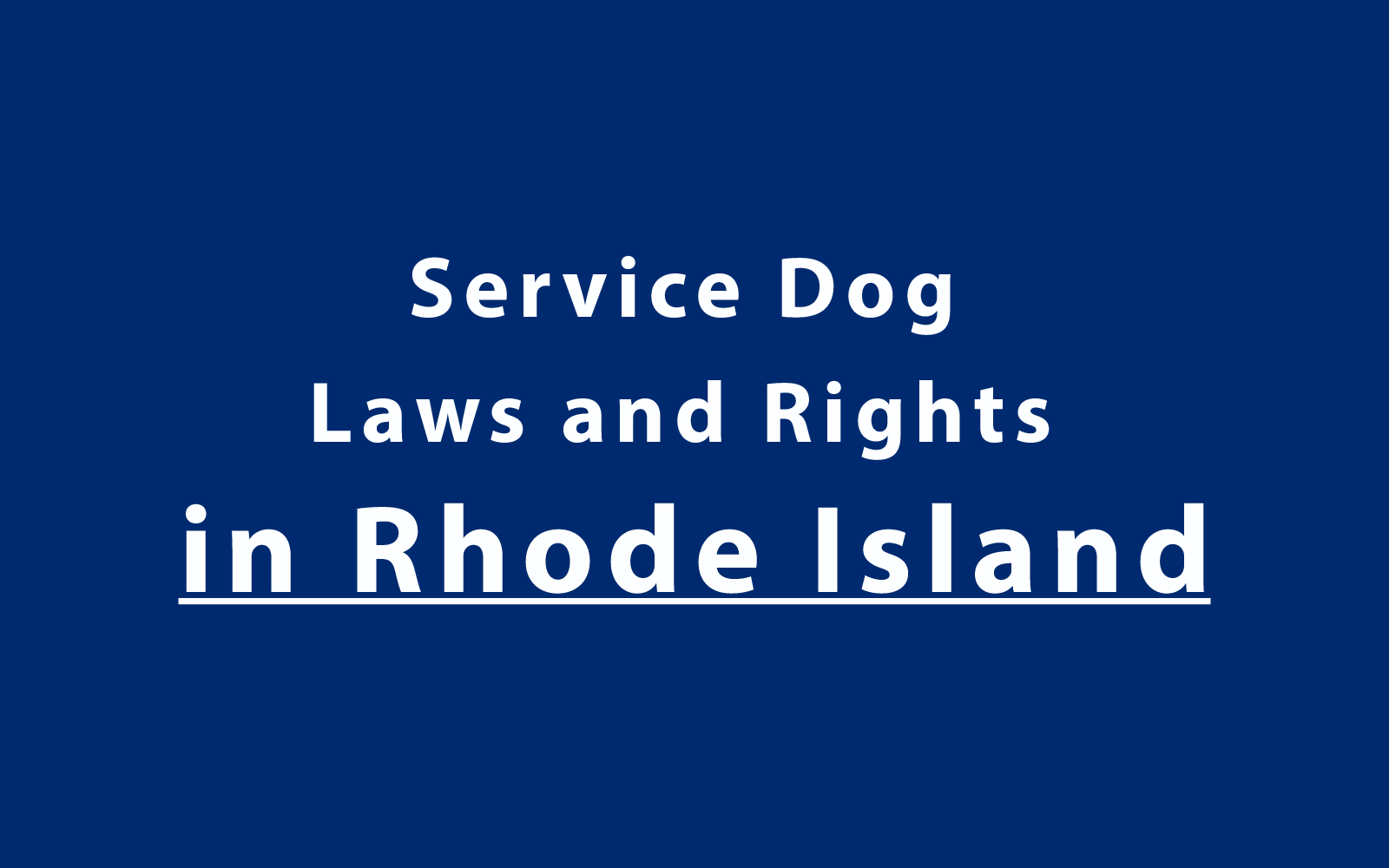Service Dog Laws and Rights in Rhode Island

Service dogs are not just pets—they are vital support companions for people with disabilities, trained to perform specific tasks that enable independence, safety, and inclusion in everyday life. Understanding the rights and responsibilities surrounding service dogs is essential not only for handlers but also for the public, landlords, employers, and educators.
In Rhode Island, service dog laws incorporate federal protections like the Americans with Disabilities Act (ADA), Fair Housing Act (FHA), and Air Carrier Access Act (ACAA), as well as state-specific laws that safeguard equal access and prevent discrimination.
This guide explains the rights of service dog users in Rhode Island and provides practical information on how to navigate public spaces, housing, employment, travel, and more
What Qualifies as a Service Dog in Rhode Island
According to the ADA, a service dog is defined as a dog individually trained to perform specific tasks directly related to a person’s disability. Rhode Island law mirrors this definition through statutes like R.I. Gen Laws §5-37-1 and §5-37-4.
Qualifying tasks include:
• Guiding a person who is blind
• Providing balance or mobility assistance
• Alerting to seizures, blood sugar drops, or panic attacks
• Reminding a person to take medication
• Interrupting self-harming behaviors
Note: Emotional Support Animals (ESAs) and therapy dogs, while important, are not legally considered service dogs. They are not trained to perform tasks and therefore do not have public access rights under the ADA or Rhode Island law.
Public Access Rights in Rhode Island
Service dogs have full access rights to public accommodations under both federal and state law.
Permitted locations include:
• Restaurants and cafes
• Retail stores and shopping malls
• Hospitals and clinics
• Parks, libraries, and museums
• Hotels, motels, and public lodging
• Government buildings and public services
What staff are legally allowed to ask:
1. Is the dog a service animal required because of a disability?
2. What task has the dog been trained to perform?
They cannot request certification, demand a demonstration of the task, or inquire about the nature of the handler’s disability.
Handler responsibilities:
• Keep the dog under control with a leash, harness, or voice control
• Ensure the dog is housebroken
• Remove the dog if it is disruptive, aggressive, or poses a threat
Denial of access based on breed, size, or appearance is prohibited if the dog meets the service dog criteria.
Housing Rights in Rhode Island
The Fair Housing Act (FHA) protects people with disabilities from housing discrimination and requires landlords to make reasonable accommodations for service dogs and emotional support animals (ESAs).
Key protections include:
• No pet fees or deposits may be charged for service animals
• Breed or size restrictions do not apply
• Landlords must accept legitimate service dogs even in “no-pet” housing
If the disability and need for a service animal are not obvious, landlords can request documentation that:
• Verifies the tenant has a disability
• Explains how the dog helps alleviate symptoms or effects of that disability
Landlords may not:
• Ask for medical records
• Demand training or certification documents
• Delay tenancy due to the request
Complaints about housing discrimination can be filed with the Rhode Island Commission for Human Rights or HUD.
Employment Rights
Title I of the ADA ensures people with disabilities have the right to request reasonable accommodations in the workplace—including the use of a service dog. Rhode Island’s state laws reinforce this under local employment discrimination protections.
Steps to request a workplace accommodation:
1. Submit a written request to your HR department or manager.
2. Include supporting documentation from a healthcare provider if necessary.
3. Engage in an interactive process to determine a reasonable accommodation.
Employers must allow service dogs unless doing so would create an undue hardship, such as safety risks or significant disruption to operations.
If your request is unfairly denied, you can file a complaint with the EEOC or Rhode Island Commission for Human Rights.
Travel and Transportation
Air Travel
The Air Carrier Access Act (ACAA) ensures people with disabilities can fly with service dogs, including psychiatric service dogs.
To fly with your dog, you must:
• Submit the U.S. Department of Transportation’s Service Animal Transportation Form
• Ensure the dog is well-behaved and under control at all times
• Comply with the airline’s policies regarding seating, safety, and behavior
Ground Transportation
Service dogs are permitted on all Rhode Island public transportation systems, including:
• RIPTA buses
• Taxis
• Rideshare services like Uber and Lyft
• Amtrak trains
Denying access due to the presence of a service dog is illegal. Violations can be reported to the Department of Transportation or the Rhode Island Attorney General’s office.
Access to Education and Schools
K–12 Public Schools
Under the Individuals with Disabilities Education Act (IDEA) and Section 504, public schools in Rhode Island must allow students with disabilities to use service dogs.
Schools may ask for:
• Assurance that the dog is trained to behave in a school setting
• Confirmation of the disability and the role of the dog
Parents may be responsible for the dog’s care during the school day if needed.
Colleges and Universities
Service dog access must be provided in all areas of campus:
• Classrooms and labs
• Dormitories and dining halls
• Libraries and recreation centers
Students should coordinate with the Office for Students with Disabilities or equivalent department to register the accommodation.
Training and Registration in Rhode Island
Neither the ADA nor Rhode Island law requires certification, ID cards, or registration for service dogs.
Owner-training is permitted, provided the dog is trained to perform disability-related tasks and behaves properly in public.
Benefits of voluntary registration:
• Easier recognition in public places
• Fewer conflicts with landlords or business owners
• Peace of mind when traveling
AssistanceDogPartners.org provides:
• Optional ID cards, service dog vests, and registration kits
Training should prioritize public manners, obedience, and reliability in task performance.
Fraud and Misrepresentation
Rhode Island takes service dog fraud seriously. Falsely claiming a pet as a service animal can lead to civil or criminal penalties.
Misrepresentation includes:
• Using vests or ID cards on pets that are not task-trained
• Claiming an ESA or therapy dog is a service dog
• Entering public areas with an untrained or disruptive animal
Penalties may include:
• Fines
• Community service
• Legal action depending on the nature of the offense
Violations can be reported to local law enforcement or the Rhode Island Commission for Human Rights.
Rhode Island Service Dog Resources
• Rhode Island Commission for Human Rights
• Disability Rights Rhode Island
• RI Department of Behavioral Healthcare, Developmental Disabilities & Hospitals (BHDDH)
• Local trainers and support groups in Providence, Warwick, Newport
Frequently Asked Questions (FAQs)
Is service dog registration required in Rhode Island?
No. Registration is not required by law, but it can be helpful for travel or housing.
Can psychiatric service dogs access public places like guide dogs?
Yes. Psychiatric service dogs are covered under the ADA if task-trained.
Can a landlord charge me a pet deposit for a service dog?
No. Service animals are exempt from pet-related fees.
What if my service dog is denied access?
You may file a complaint with the Rhode Island Commission for Human Rights or the U.S. Department of Justice.
Can I train my own service dog?
Yes. There is no legal requirement to use a professional trainer.
Conclusion
Rhode Island upholds strong legal protections for service dog handlers, ensuring equal access to public spaces, housing, workplaces, education, and transportation. As a service dog handler, understanding your rights and responsibilities allows you to advocate effectively for yourself and your dog.
If you’re starting your service dog journey, need training support, or want optional registration, AssistanceDogPartners.org is here to help.
Confidently live life with your service dog by your side—empowered by knowledge, training, and community support.



